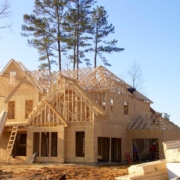Should I get my new construction home Inspected?
WHY SHOULD YOU GET A NEW CONSTRUCTION INSPECTION?
Many of our clients tell us, “I’m buying a new construction home directly from a builder and they told me I don’t need an independent inspection.” Whenever we hear this statement, my first thought is: most people who sell their homes would also prefer you to not get a home inspection! Let’s face it, people want things to go smoothly when they’re selling something. I don’t know too many people who like to haggle over the purchase price or negotiate repairs. However, buying a home is usually the biggest financial investment any of us will EVER make. Why wouldn’t you find out everything you can about such an important investment? When making this type of investment, getting an independent home inspection is one of the most affordable ways to minimize your financial risk. Let’s outline reasons why an independent home inspection is necessary when buying new construction.
Builder objections: Typically, the builder states to the home buyer, “We build a great house and we have a personal in-house inspector who checks everything out. So, Mr. Home Buyer, you don’t need to spend the money on an outside inspector.” Ever hear that one?
Our response: While it’s true many large builders have their own in-house inspector, it should be noted that they are primarily only checking for cosmetic issues. Things like paint blemishes, chips/overspray, missing caulk, etc. In-house inspectors are, in most cases, not licensed and trained. They are people the builder has hired very inexpensively to check for things YOU may see that would affect the aesthetic appeal of the home. They are not doing an in-depth and detailed inspection of the house. Furthermore, this “inspector” is THE BUILDER’S REPRESENTATIVE! Think of it almost like a homeowner selling their house and having THEIR handyman tell you, “It’s all good. There’s no need for you to hire an inspector.”
Builder objection: We got a C.O. (certificate of occupancy) from the city/county code enforcement inspectors who looked at all the plumbing, electrical, building, HVAC, etc. They would not issue a C.O. if they found anything wrong.
Our response: Code Enforcement Officers have multiple houses in numerous areas to inspect daily. Because they are a government agency with extreme financial restrictions, they are woefully understaffed, stretched incredibly thin, and unable to spend a lot of time on any of the thousands of houses under construction. I can only assume, as a result of these restrictions, they are looking primarily for MAJOR code violations when they visit a house under construction. Sometimes, they will miss many issues because they’re constantly rushing to the next inspection. I can say that this year alone, I have inspected dozens of houses that have been issued C.O.’s by the county/city Code Enforcement Officers. In one house, I found areas of roof flashing had NEVER BEEN INSTALLED! During the inspection, I could see the bare wood of the roof decking (where flashing should be) which will result in wood rot and water damage in the attic. HOW was this issue overlooked by not only the Code Enforcement Officer but by the builder’s in-house Inspector, the sub-contractors who put the roof shingles on, the builder, and any of his representatives as well? The simple answer: they are all rushing to get a house built and get paid.
Code officials and the builder’s inspectors are usually not using ladders that would allow them to see these things. This is just one example of the hundreds of inspections we have done on new houses with similar issues. We have found shingles missing completely from hidden sections of roofs, improperly installed or broken siding, shoddy workmanship, improperly installed plumbing, HVAC and electrical defects, and many other defective issues. To see example videos of the multiple defective issues we see daily, go to my Facebook page @ New South Property Inspections, Inc. | Facebook
Inexperience: Another reason you need an inspection on new construction is inexperienced help or simply just poor workmanship. Did you know that many of the contractors building your homes are not licensed? Often, the Builders Foreman in charge of the construction is not even a Licensed General Contractor! They are simply following their scheduling format/guidelines and completing whatever the scheduling guidelines instruct at the proper stage. They are simply project foremen. Example: after a lot is cleared, rough graded, prepared, and compacted, the schedule states to pour footers and have foundation contractors come in.
After the foundation is installed, the guidelines state to have the framers start and continue building to get to the next stage. Many of the sub-contractors who are working on your home are trainees (you have to start somewhere). Your house may very well be the first house these contractors have EVER worked on. Code Enforcement Officers only check that the house meets the “MINIMUM” code and, as stated earlier, they often miss things. They are not checking for cracked siding, lights that trip breakers, etc. Quality of work is not checked. One example we see every day is siding that has been measured too long and then “forced” into position using over nailing. This poor workmanship causes the siding to buckle and crack over time (if cement fiber type). Do you want to trust shoddy workmanship on your biggest financial investment ever?
A home inspection BENEFITS the Builder:
A Home Inspector is not there to “invent problems” for the builder to solve. An experienced and reputable Home Inspector is there to identify as many defects of a house as possible (but even Home Inspectors can’t find everything). Your project foreman who works for the builder may have only spent on average 15 to 30 minutes PER DAY looking at YOUR house. Builders depend on their subcontractors to do a great job. We want to allocate ALL responsibility for repairs onto the builder. This HELPS the builder as well as you by identifying any missed defective issues because things can be more easily repaired BEFORE you move in.
After you move in, any repairs required will be a hassle to you and the builder because it will require contractors to enter your home. You will have strange people coming in and out of your home, which I’m sure nobody ever enjoys. Some repairs may require demolition, moving furniture, replacing floors, drywall, etc. Repairing things before you move in will save a lot of time later for the builder. In addition, if you don’t take care of any defective issues before the expiration of the Builder’s one-year warranty, the financial responsibility for those repairs is now yours alone.
The takeaway for home buyers is this: just because a house is newly constructed, never assume it has no defects. Quite frankly, anyone who thinks differently is either wildly misinformed or is just flat-out lying. If your builder is objecting to your request to bring in an independent Inspector, this should be a HUGE Red Flag! Why would any competent builder want to mask their product? Most reputable builders will welcome another “set of eyes” to catch any issues they may have missed. We are all human, nobody is perfect, and we all make mistakes. Why not have as many eyes as possible so that your financial interests are protected?
As Home Inspectors, we have no financial interest in your purchase of the home, so we have zero reasons to avoid presenting you with an honest, detailed, and thorough report on the condition of your house the day it is inspected. What is the Seller/Builder’s financial interest in preventing a home inspection? Being required to do repairs on a new house eats into their profit margins and may delay their closing and final paycheck.
Protect your investment and get a new home inspection!
The following are the top ten defective issues we find in new home construction ranked in order by occurrence.
- Broken or modified engineered Truss system – The truss system has been broken during installation or may be modified by the installer or a tradesman to make something “fit”. Sometimes, the builder repairs these, but any repair or modification to an engineered truss system MUST BE designed and certified by the truss manufacturer or a Licensed Structural Engineer. Otherwise, when YOU sell the house, a buyer may want YOU to provide certification that repairs were done correctly. This would be a minimum cost of $600 just to get an engineering certificate.
- Roof covering / shingles installed incorrectly – Shingles have been installed too tightly causing the ends/edges to “lift upward.” The sun will not heat these enough to flatten over time may allow leaks in your roof. Also, shingles installed with incorrect exposure are very commonly noted in new construction.
- Cracked slab foundations– Cracks in concrete are normal but some builders do not properly install control joints in the concrete to allow for normal expansion cracking.
- Foundation piers improperly installed– Foundation piers must be installed directly under the beams they need to support and must be properly shimmed. The beams MUST be centered over the pier and not hanging over the edge as so often noted in home inspections.
- Improperly or incorrectly installed siding– Siding installed too tightly, fasteners overdriven, siding cracked or otherwise damaged during installation, warped or buckling, and installed without proper flashing.
- Torn or damaged roof shingles – Roofers often leave shingles damaged after installation. This is usually caused by carelessness and/or the use of nailed-in “foot holds”.
- Cracked floor tiles or backsplash in bathrooms and kitchens– This is almost always due to contractor negligence and carelessness.
- Windows installed too tightly– This is usually caused during the pre-drywall phase when the installer did not properly frame and shim the window opening.
- Active plumbing leaks– Unfortunately, sometimes the plumbers forget to properly crimp pipe connections or do not use proper glues or sealants.
- Electrical issues – These vary from improperly installed light fixtures to breakers tripping from incorrect arc faults. Amazingly enough, sometimes they forget to install GFCIs in required locations.
Please contact our office at 704-628-6601 or reach us online at www.newsouthpropertyinspections.com to schedule your new construction inspection today. To see a representative new construction inspection report, look at one of our sample reports at Home Inspection, Inspector | New South Property (newsouthpropertyinspections.com)



Leave a Reply
Want to join the discussion?Feel free to contribute!